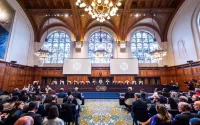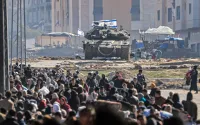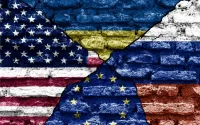9 April 2006Mark Wexler
In January of 2006 I attended the International Institute for Mediation and Conflict Resolution (IIMCR) 2005-2006 Africa Symposium in Cape Town, South Africa. IIMCR strives to expose students and young professionals to mediation and negotiation techniques in the face of mounting levels of global conflict, violent or otherwise. Beyond the rigors of the lecture hall, which offered tangible insight into the world of mediation and negotiation, the many knowledgeable participants, hailing from numerous countries and areas of conflict, offered an education untouched by many Westerners.
The conversational thread found with IIMCR participants was the role the United States and its apparent actors, such as the IMF and World Bank, play in conflict zones around the world. Through these discussions -and in recognition of the many parallels between South Africa and the United States- my mind has been on the current actions of the USA. What follows are some reflections, beliefs, and a proposed change of course as prompted by my time and interactions here in South Africa.
As strange as it might sound James Baldwin was my literary guide my first few weeks in South Africa. Writing in self-imposed exile during the 1950s Baldwin offered a clairvoyant picture of American life by looking back across the Atlantic from Europe. Currently the U.S. has exhumed an overt black-and-white world outlook, continuing to make Baldwin's words ring true on many levels in regards to social thought. To inspect American character Baldwin begins his book Nobody Knows My Name with a chapter aptly named "The Discovery of What It Means to Be an American." He dissects the racial dynamics and divisions that defined (and continue to define) our country. In his call for renewal Baldwin declares, "The time has come, God knows, for us to examine ourselves, but we can only do this if we are willing to free ourselves of the myth of America and try to find out what is really happening here." Baldwin speaks of the need to change attitudes regarding race in the U.S., a battle still being waged, even if not acknowledged by the majority. Nonetheless, in a time of Gitmo and Eastern European prisons, fore-mentioned racial disparities, a stunning gap between rich and poor, secret spying of American citizens, indefinable wars, solid deception, and ebbing truths we find ourselves again at a crossroad where we must remove the mythological American belief-of-self from the stark realities that rule the day. This dissection of myth and reality must be achieved to fully understand the core guide to American character; to find a viable future I believe Americans must now focus on finding and fixing our shattered guiding map.
Complaining will not get us to where we need to be. But reflection and change of action must be made. The world is moving on without us; our government is standing in the middle of a swamp of corruptness, which the American people now find themselves. A majority must stand to weave a coalition against the lost hearts of American leadership. As the apartheid government in South Africa was eventually deemed morally bankrupt in the world's eyes it seems the U.S. is now standing on the brink. The mythology of "moral standard-bearer" may still hold in the U.S. but is lost in the howling winds of international discourse. What can we do?
It is overdue that we recognize our highly corrupt status. As a country it seems we are running against the crowd, towards utter chaos, ignoring the red-faced screams to stop and think. We are blinded by the myth of American ideas and ideals, led astray by beliefs, but not guided by reality of action. And my friends, if it is action that speaks loudest then we undoubtedly fail in all respects. Bullets alone will not "change hearts and minds". But as Mandela, the African National Congress, and other members of the South African resistance movement taught us moral action is the only way to move forward in a progressive manner. Moral action is the process of finding a way to stand in right relation with our neighbors. This course of correcting past wrongs without an eye-for-an-eye attitude is occurring in South Africa, even after the calculated atrocities perpetrated here. South Africa is a global leader in this respect, teaching us that finding commonalities and congruent goals can be done. No excuses.
It is in this vein that we must delve into earnest examination and reflection of our current status of character. This starts with every individual and their actions or lack there of. Change truly does start from within. Only through reflection of past mistakes can solid action come forthright. I believe that this must start by forming a roadmap towards making right relations -an honest attempt to make right our historical wrongs- with our global neighbors. The truth is that the U.S.'s words about "morality" have been unmistakably mixed with a deficit of moral action. The world is rightfully confused and disappointed in us. We the people of the United States should feel the same way. We the people must act to change this - even if at first, it starts only with your self.
We can not afford to continue to walk the historically broken pathway as Baldwin accurately weaves, but we must learn from our errors. Baldwin knowingly informs us that our lacking respect for our stated ideals will mean that a price will be paid. We are nearing a breaking point and if true change of action doesn't take hold Baldwin rightly warns, "The emptier our hearts become, the greater our crimes will be."
Mark Wexler has written for both Sojourners Magazine (most notably a July 2004 feature on the Religious Right) and SojoMail (multiple contributions to Sojourner's weekly e-zine). He is currently working with Umthombo, a non-profit former street children think-tank, in Durban, South Africa. Drawing on the teachings of luminaries such as Paulo Freire and Steve Biko, Umthombo aims to empower former street children through a conscientization process to both critique existing and create new policy revolving around the issue of street children in South Africa






